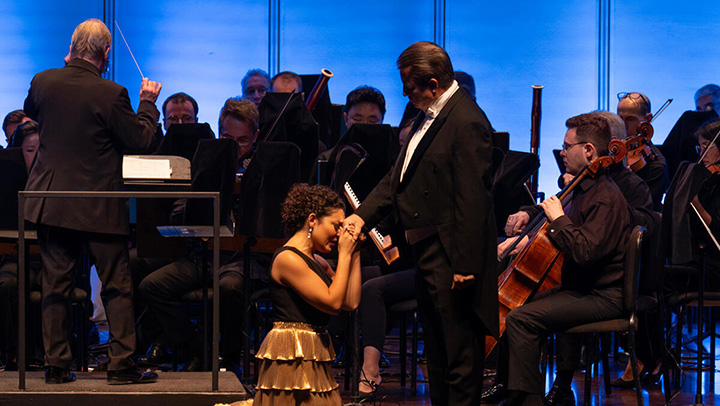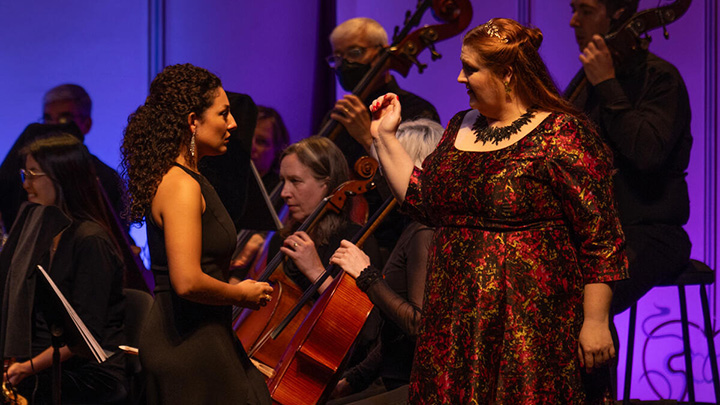There is a reason young singers cut their teeth on Mozart and why Idomeneo is virtually the only opera seria you will see in prestigious vocal competitions; the combination of frequent melodic leaps, lengthy phrases, and demanding coloratura makes for an unforgiving opera. Vocally, no principal is left unscathed.
The subject—a Cretan king forced to sacrifice his own blood by a supernatural decree—first came to Mozart in the form of the French Idomenée, a tragédie lyrique written by Antoine Danchet and André Campra. This theme, once ubiquitous in eighteenth-century operatic culture, is a harder sell for today’s audiences given its classical framework but is enlivened by Mozart’s Italianized orchestral writing and frequent dramatic dynamic contrasts in the strings and winds.
The Ravinia Festival’s semi-staged production fore-fronted the vocal and dramatic demands of Idomeneo without the advantages of a traditional operatic mise en scène. Under the musical direction of James Conlon, the orchestra took on a lyrical and animated role, especially during the many choral numbers. His influence was most audible in the ensemble “Andrò, ramingo e solo” in which he gave a sense of direction throughout the principals’ agonizing refrains. The stage director, Harry Silverstein, and the cast exceeded my expectations through their use of orchestral space, aisles, walls, and even the conductor stand. We weren’t quite in Crete, but we weren’t in suburban Chicago either.
After the Chicago Symphony Orchestra’s lifting performance of a rather conventional overture, soprano Andrea Carroll materialized from behind the orchestra as Ilia to deliver a tortured “Padre, germani, addio.” At times it seemed as if she was shying away from the very top of her character’s tessitura but she more than made up for this with her luscious middle register and perfectly placed vibrato. Both elements were on display in her later Act III “Zeffiretti lusinghieri” during which Carroll settled into her character for this message of love while also demonstrating an enviable ease and warmth in her many coloratura passages and sustained notes.
Mezzo-Soprano Samantha Hankey was a striking Idamante whose “Non ho colpa” revealed a singer capable of bringing a strength and vitality to the character seldom performed in such a compelling manner. It was thrilling to see a mezzo bring the amount of “squillo” she did to the height of her register while still maintaining a fervent darkness to her core sound. The veteran Idomeneo Matthew Polenzani was undeniably comfortable in the role—something made perfectly clear by his command of the stage and the dynamic control he brought to “Fuor del mar.” His runs visibly—and audibly—animated the audience during the infamous tenor aria.
Initially, the vocal force of the chorus during Act I’s “Godiam la pace” felt like a wall of sound in Ravinia’s intimate Martin Theater, but by Act II this strength was more welcome in numbers such as “Corriamo, fuggiamo.”
Tamara Wilson dominated Idomeneo in the role of Elettra, the vengeful princess, which she sang with a mixture of ardent beauty and moving sincerity. Her “Tutte nel cor vi sento” was truly a masterclass in Mozartian rage arias with her negotiation between the passionate ring required during Elettra’s most furious moments, and the dark coloration throughout her cries for mercy. Wilson carried this visceral passion into her final “D’Oreste d’Ajace” proving herself to be a singular Elettra.
Although the role of Arbace was significantly cut, the tenor and 2022 Operalia winner Anthony León displayed a lovely lyric spin in his sound during “Se il tuo duol.” Bass Morris Robinson deserves a special mention for his appearance as the off-stage voice of the Oracle of Neptune. He commanded attention while projecting a dynamic and resonant tone despite being confined to a few dozen measures.
As a whole, the cast proved it is possible to deliver a naturalistic production of opera seria with a limited staging. Those of us in the Chicago-area are fortunate that the Ravinia Festival connects us to singers of this level for one of Mozart’s most demanding operas.
Photos: Courtesy of Ravinia Festival / Patrick Gipson





